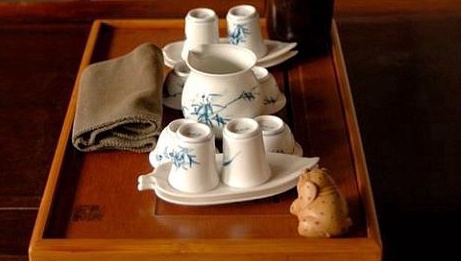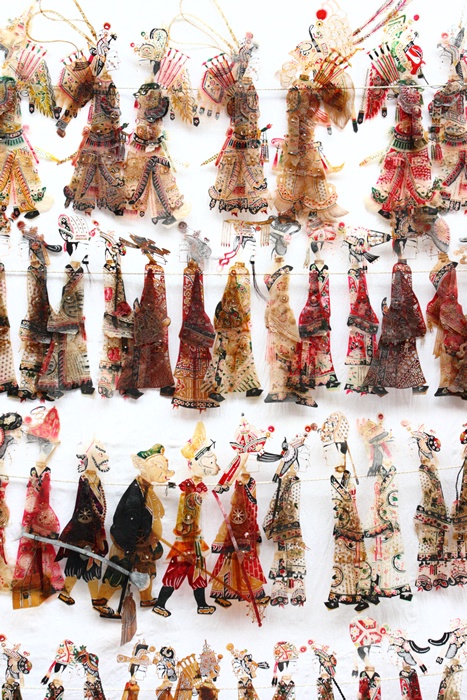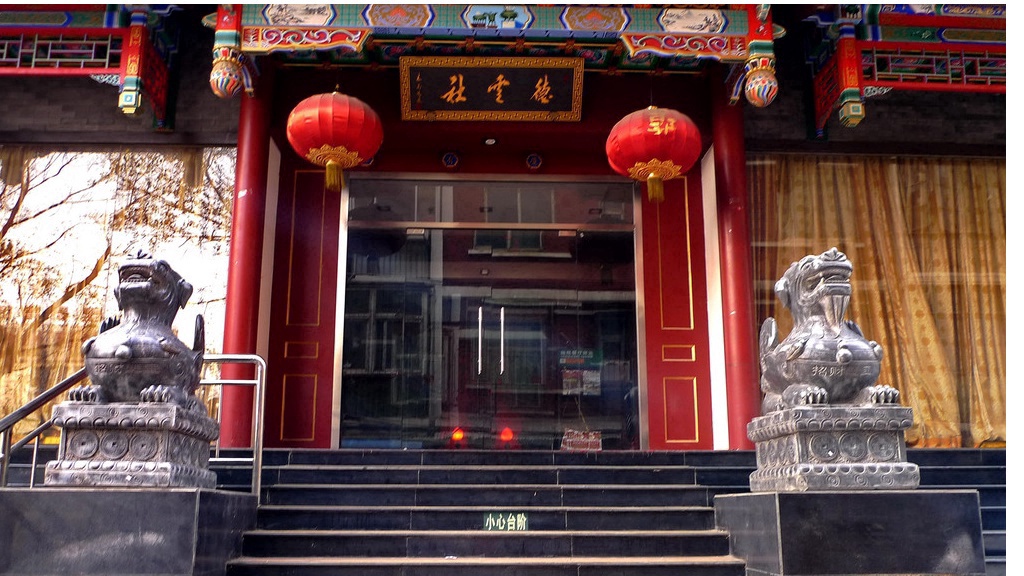Beijing is a great place to watch traditional Chinese opera, Chinese acrobatics, and folk arts such as Xiangsheng and storytelling.

Laoshe Teahouse
To get the full treatment, head to the Laoshe Teahouse where the excellent service staff is ready to explain the wide variety of quality teas. Founded in 1988, the Laoshe Teahouse is named after the writer, a well-known Chinese novelist and dramatist. Besides tea-tasting, customers can also enjoy traditional Chinese folk arts, such as cross-talk and story-telling in Beijing dialect with drum accompaniment, as well as all kinds of traditional performance art, including Peking Opera, change-mask art of Sichuan Opera, Chinese shadow puppetry, Chinese martial arts and acrobatics. It is like being in museum of Beijing folklore. It may be wise to make an appointment first in the busy season.
Add: 3 Qianmen West Avenue, Xicheng District
Tel: (8610) 6303-6830
Transportation: Subway Line 2 to Qianmen station
Zhangyiyuan Tianqiao Teahouse
Zhangyiyuan Tianqiao Teahouse is located opposite the Beijing Dongfang Hotel with great location and transportation. The antique building, covers an area of 500 square meters, can accommodate more than 200 people. Combing Beijing flavor culture, Xuannan (the south of Xuanwumen) culture and the old Tianqiao performance culture, Zhangyiyuan Teahouse provides a perfect place to taste tea while enjoy great performances for tourists.
Add: No. 18 Wancheng Road, Xicheng District
Tel: 010-83161113
Transportation: Subway Line 7 to Hufangqiao station
China Shadow Figures Culture City
Shadow play, also known as shadow puppetry, is an ancient form of storytelling and entertainment which uses shadow puppets. Chinese shadow play has a recorded history that's over 2,000 years old.

When artists perform, they not only skillfully manipulate the figures using their hands, but also sing or narrate and sometimes, they even have to hit a drum using their feet. With the changing shadows on the curtain, beautiful or intense music, attractive narration and light effects, the audience will be deeply attracted by the thrilling and splendid shadow play.
Located on the tourism circle of the Old Summer Palace Park, China Shadow Figures Culture City is a new highlight of Beijing's tourism. It is mainly composed of two major parts: the Old Summer Place Royal Shadow Play Theater and the Beijing Longzaitian (dragon in the sky) Shadow Play Museum. The performance hall covers 1,500 square meters at a capacity of 300 people.
Add: No. 64 Chaoshou Hutong, Xicheng District
Tel: (+86) 4000101889
Transportation: Subway Line 4 to Yuanmingyuan station
Beijing Xiangsheng
Xiangsheng, also known as crosstalk, is a traditional Chinese comedic performing art commonly with the form of two-man dialogue. Originated in Beijing, the art is popular across the country for over 200 years. It is widely believed that xiangsheng was formed in the late Qing Dynasty, particularly during the rule of the Xianfeng Emperor and the Tongzhi Emperor in the mid-1800s, although its roots may extend as far back as the Ming Dynasty.
The language of xiangsheng language is rich in puns allusions, rhymes, tongue-twisters and so on. The acts would sometimes include singing, Chinese rapping and musical instruments.
As one of China's most popular cultural elements, watch xiangsheng show is undoubtedly an indispensable part of old Beijingers’ life. Now this traditional folk art has been welcomed by more and more young people, making it a new fashion in Beijing.
Deyunshe

Tianqiao area in Xicheng District was an assembling place for the common people's daily entertainments in old Beijing.
Originate in Tianqiao area, Deyunshe is now one of the most popular crosstalk theaters in Beijing. Degang in 1996. Deyunshe has many branches in Beijing and other cities in China. It is an ideal destination to enjoy crosstalk created by skilled comedians.
Deyunshe Sanlitun Theater
Add: No. 4 Gongti East Road, Chaoyang District
Tel: (+86-10)58407676
Transportation: Subway Line 10 to Tuanjiehu station or Line 6 to Dongdaqiao Station
Deyunshe Tianqiao Theater
Add: No. A1 Beiwei Road, Xicheng District
Tel: (+86-10) 63040912
Transportation: Subway Line 7 to Zhushikou station
Xiha (Hip-hop) Baofupu

A xiangsheng group consists of more than 100 people; most of them are post-80s boys. The group catapulted to fame at the end of 2008. Their shows feature young with network language, buzzwords, and news interspersed in their crosstalk, depicting a strong sense of the times and comedy.
Jiaodaokou Theater
Add: 1st Floor, Xinhua Culture Mansion, No. 15 South Street, Jiaodaokou, Dongcheng District
Tel: (+86-10) 562446263
Transportation: Subway Line 5 to Beixinqiao station
Xizhimen Theater
Add: No. 141 Xizhimen Outer Street, Xicheng District, Beijing
Tel: (+86-10) 58423817
Transportation: Subway Line 4 to Dongwuyuan station
Anzhenmen Theater
Add: No. A24 Anding Road, Chaoyang District
Tel: (+86-10) 66517999
Transportation: Subway Line 10 to Anzhenmen station
Xizhao Temple Hotel
Named after one of the Eight Views of Yanjing, Jintaixizhao (Evening Glow on Golden Platform), Xizhao Temple Hotel features a combination of traditional Chinese cultural demeanor and international mode. Walking in the Hotel, you will deeply feel the sense of time and space, the interchangeability of past and present from the symphony of cultural relics, historical legends, profound humanities and literary tradition of the ancient Chinese culture.
During each weekend, a famous Xiangsheng group in Beijing, Tingyunxuan, would perform at the hotel.
Address: No. 15 Xizhaosi Middle Street, Dongcheng District
Transportation: Subway Line 7 Guangqu Mennei station
Guangmingge Teahouse
With the purpose of promoting the traditional Beijing folk art, Guangminge Teahouse opened its door in January 2005. The teahouse has worked with some local groups to provide weekly xiangsheng shows for xiangsheng fans.
Address: No. 61 West Street, Gulou, Xicheng District, Beijing
Transportation: Subway Line 2, Line 8 to Gulou Xidajie station or Shichahai station.



